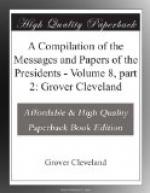in those concerns which it is the prerogative of their
independence to regulate as to them shall seem fit,
we hail with joy every indication of their prosperity,
of their harmony, of their persevering and inflexible
homage to those principles of freedom and of equal
rights which are alone suited to the genius and temper
of the American nations. It has been, therefore,
with some concern that we have observed indications
of intestine divisions in some of the Republics of
the south, and appearances of less union with one another
than we believe to be the interest of all. Among
the results of this state of things has been that
the treaties concluded at Panama do not appear to
have been ratified by the contracting parties, and
that the meeting of the congress at Tacubaya has been
indefinitely postponed. In accepting the invitations
to be represented at this congress, while a manifestation
was intended on the part of the United States of the
most friendly disposition toward the southern Republics
by whom it had been proposed, it was hoped that it
would furnish an opportunity for bringing all the
nations of this hemisphere to the common acknowledgment
and adoption of the principles in the regulation of
their internal relations which would have secured
a lasting peace and harmony between them and have
promoted the cause of mutual benevolence throughout
the globe. But as obstacles appear to have arisen
to the reassembling of the congress, one of the two
ministers commissioned on the part of the United States
has returned to the bosom of his country, while the
minister charged with the ordinary mission to Mexico
remains authorized to attend at the conferences of
the congress whenever they may be resumed.
A hope was for a short time entertained that a treaty
of peace actually signed between the Governments of
Buenos Ayres and of Brazil would supersede all further
occasion for those collisions between belligerent
pretensions and neutral rights which are so commonly
the result of maritime war, and which have unfortunately
disturbed the harmony of the relations between the
United States and the Brazilian Governments. At
their last session Congress were informed that some
of the naval officers of that Empire had advanced
and practiced upon principles in relation to blockades
and to neutral navigation which we could not sanction,
and which our commanders found it necessary to resist.
It appears that they have not been sustained by the
Government of Brazil itself. Some of the vessels
captured under the assumed authority of these erroneous
principles have been restored, and we trust that our
just expectations will be realized that adequate indemnity
will be made to all the citizens of the United States
who have suffered by the unwarranted captures which
the Brazilian tribunals themselves have pronounced
unlawful.




